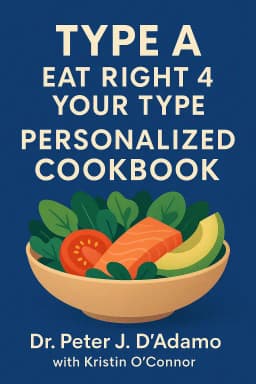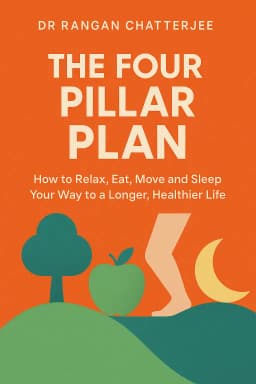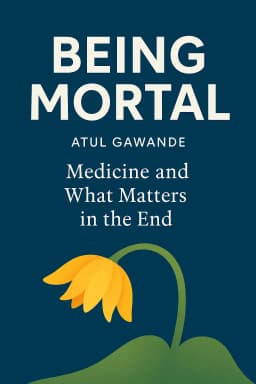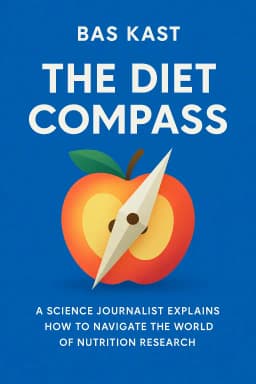
Unlocking Your Metabolism: The Hidden History and Science of Food
Golden Hook & Introduction
SECTION
Nova: What if I told you that the one thing we’ve been taught to fight, to burn, to eliminate at all costs—body fat—isn't the enemy? What if it's actually one of the most complex and powerful organs in your body, capable of growing like a tumor but also holding the keys to regeneration? This isn't science fiction; it's the new science of metabolism. And understanding it changes everything.
eck: That’s a powerful way to start, Nova. It immediately makes you question a lifetime of assumptions.
Nova: It really does. And that’s why I’m so excited to have you here, eck. With your interest in nutrition, motivation, and history, you’re the perfect person to explore this. Today, we're diving into Dr. William Li's 'Eat to Beat Your Diet' from two fascinating angles. First, we'll uncover the shocking secret life of our own body fat. Then, we'll travel back in time to see how the fusion of Mediterranean and Asian food cultures created a powerful, and delicious, blueprint for metabolic health.
eck: I'm ready. It sounds less like a diet book and more like a detective story about the human body.
Nova: Exactly! It’s an investigation. So let's get into it.
Deep Dive into Core Topic 1: Fat: The Misunderstood Organ
SECTION
Nova: So, eck, let's start with that first big, mind-bending idea. We think of fat as just... storage. A passive lump of stuff we want to get rid of. But Dr. Li paints a radically different picture. He describes a study from the University of Massachusetts that I just can't get out of my head.
eck: Oh, I'm intrigued. What happened?
Nova: Picture this: scientists take a tiny piece of human belly fat, just a small sample, and they place it in a petri dish. They bathe it with liquid nutrients to keep it alive, and they just watch. And within four days, something incredible happens. Tiny, new blood vessels begin to sprout from the fat itself, like branches from a tree, reaching out to create their own life-support system.
eck: Wait, so it was building its own infrastructure?
Nova: Precisely. It was actively growing, recruiting a blood supply to feed itself, in the exact same way a cancerous tumor does. The scientific term is angiogenesis. This shows that excess fat isn't just sitting there; it's actively working to expand and sustain itself.
eck: Wow. That completely reframes it. It's not passive stuff we're trying to shrink; it's an active, resource-seeking system. From my tech background, that sounds less like a simple storage drive and more like a self-replicating network that builds its own servers. That's so much more complex, but also... much more interesting to tackle.
Nova: It is! And that’s the key. If it can grow its own blood supply, Dr. Li's research shows we can use certain foods—he calls them antiangiogenic foods—to trim it back, to starve it. But here's the flip side, the part that I think will really resonate with your 'Caregiver' side, eck. Fat also stores our body's most precious resource: stem cells.
eck: The regenerative cells?
Nova: The very same. The book tells this incredible story of a young man who had a catastrophic fall that severed his spinal cord, leaving him a quadriplegic. As part of an experimental treatment, doctors harvested adipose stromal cells—stem cells—from his own belly fat. They cultivated them and then injected them back into his injured spinal cord.
eck: And what was the result?
Nova: Within months, he started regaining movement in his arms and legs. Over the next four years, his paralysis was significantly reversed. The healing power was locked inside the very tissue we're all taught to hate.
eck: That's unbelievable. So it's both the problem and the potential solution, all in one tissue. It’s not about eradication, but about balance and management. That's a much more motivating framework than just 'fat is bad.' It feels less like a battle and more like… learning to work with a powerful, and sometimes dangerous, part of yourself.
Nova: You've hit on the exact spirit of the book. It’s not a war on your body; it’s about understanding it. And that brings us to the 'how.'
Deep Dive into Core Topic 2: The MediterAsian Way: A Historical Feast
SECTION
Nova: And learning to work with it is the perfect segue. Because if we're not just 'battling' fat, what's the strategy? Dr. Li doesn't propose another restrictive, miserable diet. Instead, he points to history.
eck: Okay, now you're really speaking my language. I'm fascinated by figures like RBG and Washington, people who shaped history. The idea that our diet has a history is compelling.
Nova: It absolutely does. Dr. Li introduces this beautiful concept he calls the "MediterAsian Way." It's not a diet he invented, but a recognition of the fusion between two of the world's healthiest eating patterns: Mediterranean and Asian. He shares these wonderful personal stories that led him to this idea. He talks about growing up in Pittsburgh and going to this annual folk festival, tasting all this amazing food from Greece, Italy, China, the Philippines...
eck: So his curiosity started with culture, not just science.
Nova: Exactly. And then, before medical school, he took a gap year. He wasn't just in a lab; he was living with families in Italy, he was helping monks cook an Easter feast in a Greek Orthodox monastery, and he was traveling through different provinces in China. He was seeing firsthand how food was woven into the fabric of life. And he realized these two 'diets' weren't as separate as we think. They were connected.
eck: How so?
Nova: By the ancient Silk Road. He explains that for centuries, this trade route was a conduit not just for silk and spices, but for foods. Things we think of as distinctly 'Mediterranean' or 'Asian' actually share a lineage.
eck: The Silk Road! I love that. So you're saying foods were migrating and blending, just like cultures and ideas. That makes the whole concept feel so much more organic and less like a sterile, scientific prescription. It’s not a list of rules; it’s a story.
Nova: It's a living story! He talks about how peaches, which we associate with places like Georgia or Italy, actually originated in China and traveled west along the Silk Road. Same with apricots and even some types of apples. So when we eat them, we're participating in this ancient, global exchange. It completely breaks down the artificial walls we put up between cuisines.
eck: That's fascinating. It removes the dogma. It’s not about "this is a Mediterranean food" or "this is an Asian food." It's about a shared heritage of healthy eating.
Nova: Precisely. And the science backs it up. The book mentions a study conducted in Rome, of all places. They put one group of obese adults on a 1,200-calorie traditional Chinese diet—rich in beans, ginger, seaweed, fish. The other group got a 1,200-calorie Western diet—more meat, cheese, and so on.
eck: Same calories, different foods. What was the outcome?
Nova: The group eating the Chinese diet lost significantly more weight. But here's the kicker for motivation: their hunger pangs decreased by 88 percent. The Western diet group's hunger only dropped by 50 percent. They were more satisfied on the Chinese diet.
eck: That makes so much sense. It's not just about the 'what' but the 'how' and the 'why.' A diet rooted in history and culture, one that's designed for satiety and pleasure, feels so much more sustainable. It's not a fad; it's an inheritance. That's incredibly motivating for someone like me who wants to build lasting habits, not just follow a temporary plan.
Nova: An inheritance. I love that. It’s a legacy of health we can all claim.
Synthesis & Takeaways
SECTION
Nova: So, when we put it all together, it's this beautiful two-part revelation. First, we have to completely rethink what body fat is—it's this dynamic, powerful organ. And second, the key to managing it isn't deprivation, but embracing this rich, historical tapestry of food—the MediterAsian way.
eck: It really shifts the goal. The objective isn't just 'losing weight' anymore. It's about 'gaining knowledge'—about your own body's complex systems and about the deep history of the food you eat. It turns a chore into a journey of discovery.
Nova: That’s the perfect way to put it. It’s an empowering journey. So, as we wrap up, what’s the one thought or question you’d want to leave our listeners with?
eck: I think it comes back to that idea of discovery. This approach gives you permission to be curious in the grocery store, to be an explorer in your own kitchen. So, my question for everyone listening is the one you posed earlier, Nova, because it’s the perfect starting point: What's one MediterAsian food you're now curious to explore this week? Maybe it's trying real kimchi for its probiotic power, or using a high-quality extra virgin olive oil and tasting the difference, or even just appreciating the incredible history in the apple you're eating.
Nova: A fantastic, and delicious, call to action. eck, thank you so much for bringing your perspective to this. It’s been a fascinating conversation.
eck: The pleasure was all mine, Nova. I’ve learned so much.









